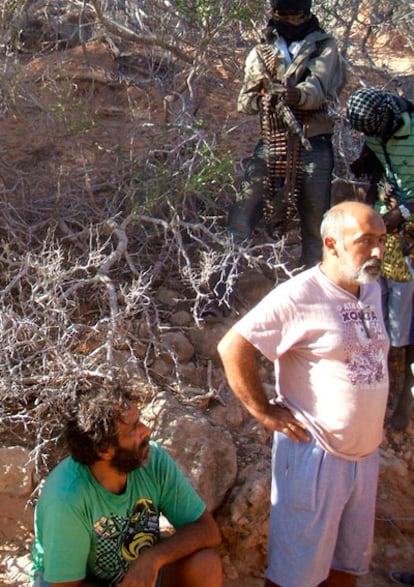Pirates release two Galician sailors
Fishing firm denies claims by Somali sea robber it paid $5 million ransom
Juan Alfonso Rey Echeverri and José Alfonso García, the two Galician sailors kidnapped by pirates in late December, were released Saturday morning after four and a half months in captivity. The two men, apparently in good health, were transferred to a vessel belonging to the Spanish company Pescanova, which was sailing to a "safe harbor," which has not been disclosed for security reasons.
"The operation has not ended," said sources close to Pescanova, explaining that the company is staying silent over the matter because there are still risks, given that the boat is sailing through waters where pirates operate. Rey and García are expected to arrive in Galicia by midweek.
In Mogadishu, Reuters reported statements given by a pirate spokesman, who identified himself as Adam, explaining that the two Spaniards had been released from the Italian-flagged ship Savina Caylin, which was hijacked on February 8, after a $5-million (3.5 million euros) ransom was dropped from an airplane. But sources close to the owner of the boat flatly denied that any money was paid.
Rey, a native of Muros in A Coruña, and García, of Pontevedra, were the captain and the boatswain, respectively, of the Vega 5, a 24-meter-long vessel with a capacity of up to 140 tons of cargo. The Mozambique-flagged ship was operated by Pescamar SL, a joint venture with the Spanish company Pescanova.
The rest of the fleet lost contact with the Vega 5 on December 28, while it was operating between Mozambique and Madagascar, off the port of Beira. On board were 24 crew, all Mozambicans, at least three Indonesians and the two Spaniards. The next day it was sighted southwest of the Comoros, sailing due north and towing a boat, which, together with the fact that it did not answer the radio calls, confirmed that the crew had been kidnapped.
The hijacking caused great concern because Somali pirates had never attacked so far south. In fact, Mozambique's waters are outside the area covered by Operation Atalanta, which was set up to help fight piracy, and Vega 5 had no private-security agents, as do the Spanish tuna fishing vessels that operate in the Indian Ocean.
The government only officially admitted that the Vega 5 had been hijacked on January 6, through Defense Minister Carme Chacón, when the ship was already anchored off the pirate port of Hobyo.
From the start, government sources made it clear that the negotiations with the kidnappers was Pescanova's or Mozambique's responsibility because the ship was flying the flag of that country. It was clear that Spain didn't want another incident like that of the Alakrana, when the government reportedly paid a ransom for the release of the 36-member crew of the Basque fishing vessel, which was held at sea for 47 days in 2009.

Tu suscripción se está usando en otro dispositivo
¿Quieres añadir otro usuario a tu suscripción?
Si continúas leyendo en este dispositivo, no se podrá leer en el otro.
FlechaTu suscripción se está usando en otro dispositivo y solo puedes acceder a EL PAÍS desde un dispositivo a la vez.
Si quieres compartir tu cuenta, cambia tu suscripción a la modalidad Premium, así podrás añadir otro usuario. Cada uno accederá con su propia cuenta de email, lo que os permitirá personalizar vuestra experiencia en EL PAÍS.
¿Tienes una suscripción de empresa? Accede aquí para contratar más cuentas.
En el caso de no saber quién está usando tu cuenta, te recomendamos cambiar tu contraseña aquí.
Si decides continuar compartiendo tu cuenta, este mensaje se mostrará en tu dispositivo y en el de la otra persona que está usando tu cuenta de forma indefinida, afectando a tu experiencia de lectura. Puedes consultar aquí los términos y condiciones de la suscripción digital.








































